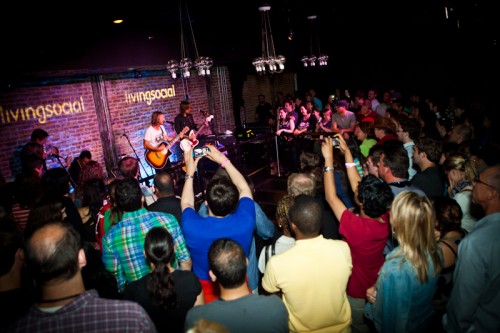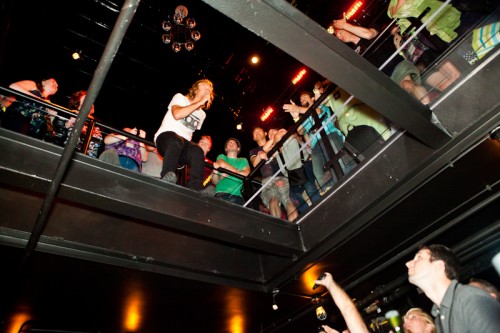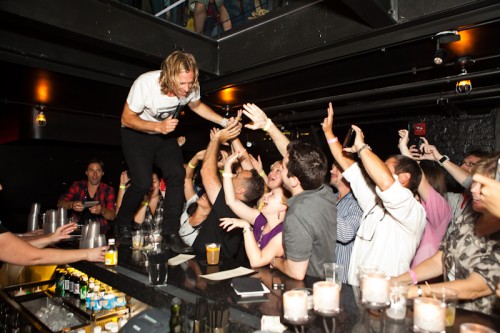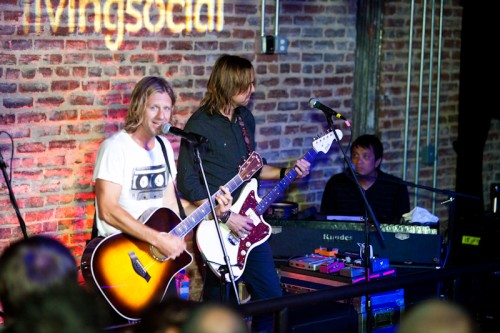
Photo by Nicholas Donner Photography
If I had the ability to create an award for the “Best Hidden Treasure Venue in D.C. to See Live Music” then it’d have to go to Living Social‘s 918 F Street. It combines the intimacy of a speakeasy with crystal clear acoustics to make way for one of the most creative spaces for live music in town. An intimate crowd of 200 fans opted-in to a Living Social deal featuring an exclusive Switchfoot acoustic performance from the Grammy Award winning band on Friday June 1 complete with a post-concert meet and greet option for a higher ticket price to a limited amount of fans.
Frontman Jon Foreman and his fellow bandmates made it a point throughout the night to emphasize the fact that the evening’s performance special. It was apparently a throwback to their earlier days back when Foreman, his brother/bassist Tim, and drummer Chad Butler were a three-piece band playing fraternity parties. While the show wasn’t quite a frat party, it did have a laid back feel. It might’ve been the fact that Switchfoot calls San Diego, Ca. home. It also could’ve been a direct result of the room’s floor plan. I’ll venture to guess it’s somewhere in between the two.

Photo by Nicholas Donner Photography
The double-level space had enough of a ledge to support five band members, their gear, a sound system, and sound engineers. That ledge was surrounded in a U shape by a railing space for patrons to stand. In the empty space inside the railing is open air with a view from the basement bar up to the stage ledge. It created quite the jungle gym for Foreman to meander around in during the show. Fans loved it. He looked like he loved it too. It essentially enabled an all-night-long fan love fest.
Fans were treated to shenanigans and witty banter. Some even joined in on the bits. A fan tossed Foreman his own cowboy hat across the open air space above the basement bar. Foreman then proceeded it wear it for a full song performance before giving it back. There was also a question and answer style break between songs that the band answered on the spot. All questions were gathered before showtime by Living Social and then issued directly to Switchfoot for on-stage bantering purposes. It was a nice touch and a hell of a lot easier than having fans raise their hands mid-show and trying to yell over a crowd of people.

Photo by Nicholas Donner Photography
Switchfoot seemed pretty content to show their fans the love right back. The band, whose three original members have been together formally in some capacity since 1996, has seen a stint of career longevity that others have not. The key to the group’s ability to create, rinse, and repeat is their songwriting. The process may start with Foreman but Switchfoot weighs in pretty much every step of the way.
Guitar player Drew Shirley, who joined Switchfoot during the making of their fifth album “Nothing is Sound” in 2005, and Butler joined We Love DC after the show to talk songwriting and their experience on stage at 918 F Street. Here’s what they had to say.
Rachel: What does it mean to you to play a show like this in an intimate venue? It was mentioned on stage multiple times that the night was “something special.” What does it mean to you to play a place like 918 F Street?
Chad Butler: We love playing the big shows with the lights and huge guitar amps cranked up to eleven but there’s something great about an intimate venue where you can interact with the audience. And that’s what it’s all about, that kind of two-way dialogue that you’re having, because that’s what we’re really after each night.
Sometimes in a big situation you get it when the crowd starts singing back louder than the band but that’s a rare situation. And tonight, this was really unique. This was stripped down, totally acoustic, didn’t even really follow a set list. It was people calling out songs, and you know what, the great thing about being in DC is that people love music and they genuinely care about what’s going on here [tonight]. So it’s not, you know, half disinterested people in the back. Everybody was engaged.
Drew Shirley: One of the greatest things in the world is when someone takes a song of yours and makes it their own. This was filled with a room of people that was doing that [tonight] in a way that we don’t usually get to see as a band. We’re not usually that close to where people are talking, shouting out, we’re responding and just answering questions talking to them.
So a lot of things happened tonight that were CRAZY and one-of-a-kind and very unique and things that we’ll remember as memories forever.
C: When our keyboard player (Jerome Fontamillas, who joined the band for their fourth album “The Beautiful Letdown” in 2003) got a dare to play drums and jumped up and actually did it, I was impressed cuz that doesn’t happen. I don’t know if it would’ve been the reverse role if I had gotten over and played keyboards. It was a good moment.

Photo by Nicholas Donner Photography
R: You guys have been around for awhile now. How would you speak to the longevity of the band?
C: We’ve had incredible support from people that connect with the songs and we find that the most personal songs have become the most universal. We try to make honest music. We try to talk about things that matter to us and sing songs that we want to sing night after night. For us, I think, music has always been a vehicle to explore the world and you know when someone relates to a song halfway around the world and feels like they can get something out of it, it might be different than what we understand the song to mean, but that’s the beauty of music is it’s pulling this really diverse crowd of people together to sing the same song.
R: When you guys are all songwriting together, what do you think makes the band such a cohesive unit? Your biggest strength as a band besides the live show, to me, has always been songwriting. How does Switchfoot work together to achieve something like that, a machine that continues to churn the material out?
D: It can be grueling or can be quick. A lot of times Jon will write a song on acoustic guitar and, first of all, that can come quick or be ages and ages where it’s changing and then finally ended upon, but he likens it to archeology where you’re digging and you’re not exactly sure what’s down there if you hit something and sometimes you have to dig a lot to get it out and you realize there it was all along.
We all kind of throw in our ideas and may the best idea stand. We just kind of all chip in on every kind of idea and it’s really sort of a mysterious process because sometimes it happens really fast and sometimes it happens slow and I wish I could figure out exactly how but that’s the beauty of it. You don’t know. Some songs will stick around for three records and then finally make it on the fourth, you know?
C: We want to play songs that we all believe in and we connect with on an emotional level and a spiritual level. If it moves us hopefully it will move other people.


